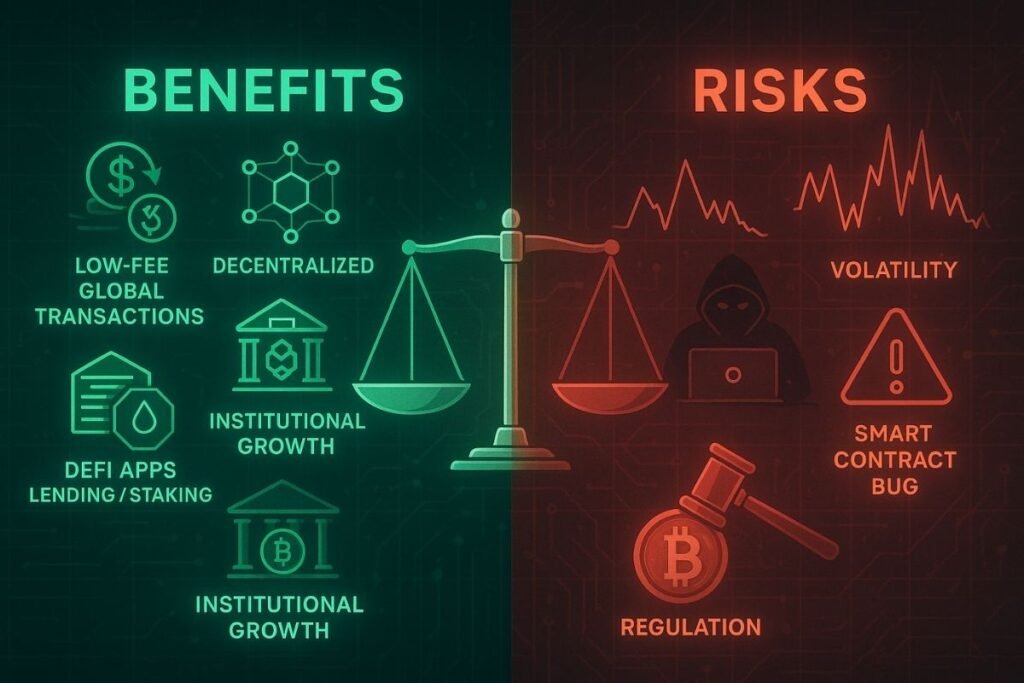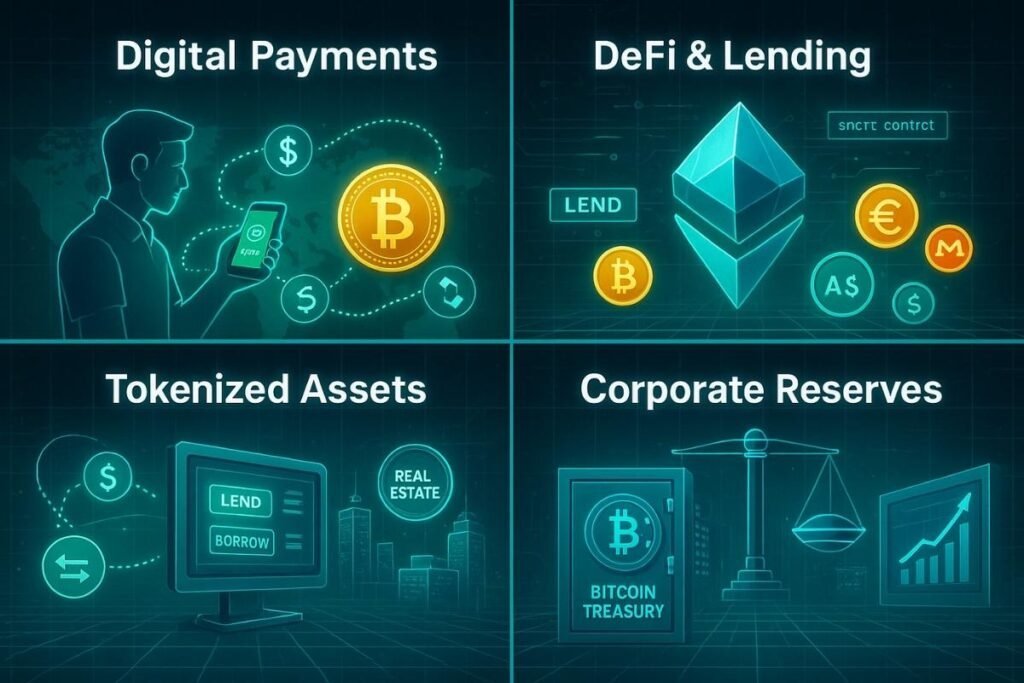If you have ever wondered what is cryptocurrency, you are in the right place. Cryptocurrency is a digital form of money and this article will walk you through how it works, why it matters and what trends to watch in 2025.
We’ll keep things friendly and simple. You’ll learn the basics, key types, pros and cons, how to buy it securely and the most important smart money trends today.
What Is Cryptocurrency?
Cryptocurrency is digital cash secured by cryptography. It lives on a blockchain, a decentralized public ledger where every transaction is recorded transparently. Unlike bank issued money, cryptocurrency runs on networks of independent computers.
It relies on consensus mechanisms like proof of work or proof of stake to verify transactions and create new coins. Bitcoin, introduced in 2009, was the first cryptocurrency and remains the most recognized by far.
Why Cryptocurrency Matters

Cryptocurrency broke new ground because it bypasses traditional financial intermediaries. Transfers happen peer to peer, without banks or governments in the middle.
That made crypto appealing for fast global transactions, lower fees and financial access in areas underserved by banking systems. Also, because it is pseudonymous, users’ identities remain partly shielded, though all transactions are visible.
How Cryptocurrency Actually Works
At its core, cryptocurrency works through a blend of cryptography, decentralized networks and user driven control without relying on traditional banks or governments.
Blockchain Technology Basics
A blockchain is a chain of blocks, each containing a batch of confirmed transactions. All participants (nodes) agree on each block before it’s added. This ensures transparency and tamper resistance.
Consensus systems like proof of work (used by Bitcoin) or proof of stake (used by many newer networks) keep the network honest and generate new units of crypto.
Wallets and Keys
Owning cryptocurrency means controlling private keys, which are stored in digital wallets. There are hot wallets (online, convenient but less secure) and cold wallets (hardware or offline, much more secure).
Your wallet never holds coins physically in fact it only holds the keys that unlock transactions recorded on the blockchain.
Mining, Staking & Issuance
New coins are created via mining or staking. In proof of work, miners solve computational puzzles (mining). In proof of stake, holders lock up coins to validate transactions (staking). Both secure the blockchain and issue new crypto.
Top Types of Cryptocurrency

While thousands exist today, most cryptocurrencies fall into a few main categories based on their function and purpose.
Bitcoin (BTC)
Bitcoin remains the flagship cryptocurrency. It pioneered decentralization and monetary scarcity. In 2025, BTC trades above $120,000 thanks to growing institutional and treasury demand.
Ethereum (ETH)
Ethereum is a programmable blockchain that supports smart contracts. It is used to build DeFi (decentralized finance), NFTs and more. Strong ETF inflows and staking incentives have lifted interest in ETH.
Altcoins and Token Types
Other popular cryptos include Monero for privacy (XMR), Bitcoin Cash (BCH) for faster payments and AI tokens like those powering machine learning platforms.
Tokens fall into categories like:
- Utility tokens, e.g. ETH or XRP, used on blockchains for functionality.
- Governance tokens, e.g. Uniswap, which grant voting rights.
- Stablecoins pegged to fiat currencies.
- Security tokens representing real assets.
2025 Cryptocurrency Market Trends
The crypto landscape in 2025 is evolving fast, driven by regulation, mainstream adoption and advancements in blockchain technology.
Stablecoin Regulation & Adoption
The U.S. passed the GENIUS Act in July 2025, establishing strict regulatory standards for stablecoins backed one to one with real assets and requiring audits.
This came as banks and regulators debated stablecoin use, while enterprises like Walmart and Mastercard explore payments via stablecoin systems.
Institutional Coin Holding & ETFs
Public companies like MicroStrategy now hold Bitcoin in their corporate treasuries. Over 135 companies hold crypto assets as strategic reserves, driving prices.
ETF inflows have surged over $14 billion in Bitcoin ETF funds have flowed into the ecosystem so far in 2025.
Tokenization and Real World Assets on Chain
Tokenization is the process of turning real assets (like real estate, bonds or artwork) into blockchain tokens is booming. Several platforms are preparing to issue digital bonds or tokenized real estate, reducing barriers to investment.
AI Crypto Convergence
Crypto projects tied to AI have exploded recently. The total AI token market rose from $2.7 billion to over $36 billion in under two years. These tokens power decentralized machine learning and platform governance.
Regulatory Landscape Evolving Rapidly
Crypto regulation now varies widely like the EU has MiCA, the U.S. advanced the GENIUS Act, while countries like China ban private crypto use. Adoption and legality depend heavily on jurisdiction.
Pros and Cons of Cryptocurrency

Like any financial innovation, cryptocurrency comes with its share of advantages and challenges that users should understand before diving in.
Benefits
- Cryptocurrency can streamline remittances, reduce cross border fees and offer financial access where traditional banking is limited.
- It removes single points of failure. Even if one exchange is hacked, the rest of the blockchain continues uninterrupted.
- New technologies like DeFi allow lending, staking and automated earning. Tokenization opens investment to new audiences.
- Public and institutional adoption is transforming crypto from a niche asset into something financial systems take seriously.
Risks and Downsides
- Cryptocurrencies are extremely volatile. Bitcoin’s beta is around 2.6, making it much riskier than traditional stocks.
- Security breaches are rising. Crypto thefts in 2025 have already totaled over $2.17 billion, including the ByBit mega heist and CoinDCX breach.
- Smart contract bugs, management failures, and weak regulatory clarity also pose risks, particularly in DeFi and tokenized systems.
- Regulators and policymakers are still catching up. Missteps or sudden policy shifts can affect prices or legal usage.
How to Get Started with Cryptocurrency

If you are new to crypto, starting is easier than you might think just follow a few key steps to buy, store, and use your digital assets safely.
Choose a Trusted Platform
Select a reputable exchange. Look at fees, supported currencies, security and ease of use. Many users value platforms like Coinbase, Binance or local regulated exchanges.
Fund Your Account
You can buy crypto using bank transfers, credit cards or debit cards. Be wary of high credit card fees and bankroll responsibly. Deposit and withdrawal times vary significantly between platforms.
Secure Storage
After purchase, move your crypto to a wallet. Use a cold wallet for long‑term holdings. Keep private keys offline and safe. Enable two factor authentication everywhere.
Start Small and Diversify
Begin with major cryptos like Bitcoin or Ethereum. Then explore tokens with specific use cases like DeFi, governance, AI or privacy. Don’t put all your funds into one coin but diversify.
Stay Informed
Keep track of regulation in your country. Watch for global news like the GENIUS Act in the U.S., tokenization launches or AI crypto mergers.
Monitor market cap and trends, know when whales accumulate Bitcoin or when institutional flows shift the market.
Beginner Tips for Safe Crypto Use
- Never share your private keys or seed phrases. Avoid phishing links and unsolicited investment schemes.
- Use reputable services for information. Because crypto is speculative, only invest money you can afford to lose.
- Check for smart contract audits before using DeFi projects. Be cautious of yield promises that sound too good to be true.
Cryptocurrency Use Cases Beyond Investing

While many people focus on crypto as an investment, its real world applications are expanding rapidly across various industries and technologies.
Digital Payments
Crypto, especially stablecoins, is increasingly used for real time, low cost payments especially cross border or where banking is limited.
DeFi & Lending
Users can lend or borrow crypto through decentralized platforms and earn interest without banks. Smart contracts automate the whole process.
Tokenized Assets
Real world assets like securities or property can now exist as blockchain tokens, increasing accessibility and reducing costs. Many expect tokenization to reach $2 trillion by 2030.
Corporate Treasury Reserves
More public companies are adopting Bitcoin as a reserve asset. This institutionalization is redefining crypto’s role in corporate balance sheets.
Is Cryptocurrency Legal Around the World?

Cryptocurrency legality and usage vary widely depending on the region. Some countries embrace it with open arms, while others remain cautious or have outright bans. Let’s break it down region by region for better clarity.
Asia: A Mix of Innovation and Restrictions
In Asia, the approach to crypto ranges from highly supportive to strictly prohibitive.
Japan
Japan is one of the most crypto friendly countries in Asia. Cryptocurrency is legal and classified as property under the Payment Services Act. The Financial Services Agency (FSA) regulates exchanges, and crypto is taxed as miscellaneous income.
Singapore
Singapore encourages crypto innovation. While cryptocurrencies are legal, the Monetary Authority of Singapore (MAS) enforces anti money laundering (AML) rules and requires licensing for exchanges.
India
India has a complicated relationship with crypto. It is currently legal to trade crypto, but there is no regulatory clarity. The government has imposed a 30% tax on profits and a 1% TDS (Tax Deducted at Source) on transactions, which has slowed adoption.
China
China has banned all cryptocurrency trading and mining. The government instead promotes its CBDC (Digital Yuan). Holding crypto is not illegal, but you cannot trade it or operate a crypto business.
Europe: Regulated but Open to Crypto
Europe is leading the way in setting clear and progressive cryptocurrency rules.
Germany
Germany considers Bitcoin and other cryptocurrencies as legal and private money. It exempts long-term holders from capital gains tax and regulates exchanges under BaFin (Federal Financial Supervisory Authority).
France
France has fully legalized crypto trading and investing. Exchanges must register with AMF (Autorité des Marchés Financiers) and comply with AML laws. France is also exploring blockchain in public services.
Italy
Italy legalized crypto but introduced a 26% capital gains tax for profits above €2,000 starting in 2023. It mandates crypto firms to register and report all user data.
European Union
The EU passed the Markets in Crypto Assets (MiCA) regulation in 2023, providing a standardized legal framework for crypto across all member states. It improves investor protection, defines stablecoins and requires licensing.
United States: Legal but Heavily Regulated
The U.S. treats crypto as a legal asset, but the laws differ by state and by use case.
Federal Level
Cryptocurrencies are legal and taxed as property by the IRS. The SEC considers some tokens as securities, while the CFTC treats Bitcoin and Ethereum as commodities. The Bank Secrecy Act applies to crypto exchanges, which must register with FinCEN and follow AML rules.
State Level
Some states, like Wyoming, are extremely crypto friendly and have passed laws supporting blockchain banks. Others, like New York, require a BitLicense, making entry more difficult.
New Developments
The Financial Innovation Act and GENIUS Act introduced in recent years aim to define crypto rules, especially for stablecoins, DAOs and DeFi protocols. Regulation is still evolving, but crypto is not banned.
Other Notable Regions
Brazil
Crypto is legal and growing fast in Brazil. The government passed a law recognizing digital assets and set rules for exchanges to operate legally.
Australia
Australia treats crypto as legal property. It is subject to Capital Gains Tax, and exchanges must register with AUSTRAC.
UAE (Dubai & Abu Dhabi)
The UAE is emerging as a global crypto hub. Dubai offers licenses through its VARA authority and Abu Dhabi’s ADGM has launched a detailed regulatory framework.
Know your own country’s regulations before investing or using crypto.
Summary: Global Crypto Legality at a Glance
| Region | Legal Status | Regulation Level | Notable Points |
|---|---|---|---|
| Asia | Mixed | Rigid to flexible | China bans; Japan, Singapore lead |
| Europe | Legal | Progressive & unified | MiCA law ensures clarity |
| U.S. | Legal | Heavy & evolving | Federal and state laws apply |
| Other Regions | Mostly legal | Varies by country | Brazil, UAE, Australia crypto hubs |
Conclusion
Cryptocurrency is digital money that lives on blockchains and works without central banks. It offers fast, global transactions and access to new financial tools.
Yet it is risky from volatility and regulatory uncertainty to security risks in platforms and smart contracts. In 2025, cryptocurrency is evolving fast like stablecoin regulation, institutional adoption, tokenization and AI crypto convergence are reshaping the landscape.
For beginners, start small, choose trustworthy platforms, secure your keys and diversify across coins with clear use cases. Stay informed on regulations in your region. Ultimately, crypto can offer real opportunity but only if learned and approached carefully.
FAQs
What is cryptocurrency and how does it work?
Cryptocurrency is digital money secured by cryptography. It operates on a blockchain, a decentralized ledger where transactions are verified via consensus systems like proof of work or proof of stake. Owners use digital wallets to access and transfer their holdings.
Is cryptocurrency safe to invest in?
Cryptocurrency carries high volatility and security risks such as hacks or scams. However, safer practices like cold wallets and trusted exchanges can reduce risk. Always invest only what you can afford to lose.
How do I buy cryptocurrency for the first time?
To buy crypto, register on a reputable exchange, verify your identity, fund with fiat currency and make a purchase. Then move your assets to a wallet and enable strong security measures.
What are stablecoins and why do they matter?
Stablecoins are cryptocurrencies pegged to real assets like the U.S. dollar, offering price stability. They are becoming vital for payments and digital treasury use and are now regulated under the GENIUS Act in the U.S.
Which cryptocurrencies are worth exploring in 2025?
In 2025, top coins include Bitcoin and Ethereum. Also worth watching are Monero (privacy), AI related tokens and projects in DeFi or tokenization. Market cap charts can guide decisions.
Can cryptocurrency be used for everyday payments?
Yes. Some merchants accept crypto directly. Stablecoins make it easier to pay without volatility. Enterprise adoption of crypto for payments is growing, particularly cross border and treasury use.






